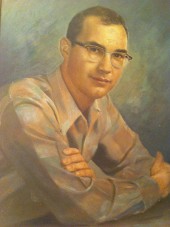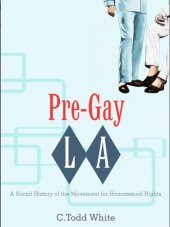Pre-Gay L.A.:
A Social History of the Movement for Homosexual Rights
by C. Todd White, Ph.D.
Review by Billy Glover
Published by the University of Illinois Press
Published April 16, 2009
LGBT history
258 pages; index
Hardcover or paperback available through Amazon.com
Submitted Aug. 2009
There is a new book giving the history of the early civil rights movement of homosexual Americans, concerned with ONE, Inc., the first major organization and its flagship publication: Pre-Gay L.A.: A Social History of the Movement for Homosexual Rights, by C. Todd White, published by the University of Illinois Press.
 Serious people interested in knowing the history of this civil rights movement have heard of only one organization in that effort: Mattachine. Some might know that there was a female group: the DOB, Daughters of Bilitis. What very few people seem to know, and this includes many LGBT historians, is that there were three early organizations and that the most important and influential one was in fact ONE.
Serious people interested in knowing the history of this civil rights movement have heard of only one organization in that effort: Mattachine. Some might know that there was a female group: the DOB, Daughters of Bilitis. What very few people seem to know, and this includes many LGBT historians, is that there were three early organizations and that the most important and influential one was in fact ONE.
A question to ask academics and those who speak on the issue of homosexual history should explain is why ONE is the organization and publication that has been ignored. White has some of the answers, and perhaps he is the first author to have access to the material to write this history. The major reason, which is only partially covered in this good book, is the personalities of the people that founded ONE magazine and ONE, Inc. and kept it going, since parts of the work of the organization still exist.
This book covers the internal disagreements and the final division of ONE, Inc., and my concern (as a major player in the separation) is similar to the question raised in another civil rights movement, that of black Americans, and made only recently in a political campaign that has changed the nation by electing an interracial president. Hillary Clinton made a statement that some misinterpreted and still don’t understand, but I do. She said that the work of black civil rights leaders like Dr. King was necessary and instrumental in preparing America for a change of attitude on the race issue, but it took President Johnson and congress to finalize that effort.
It seems to me that with all the work we at the Cahuenga faction of ONE did, it probably would still have failed, and the evil empire of the Venice faction would have won had it not been for the legal work — Ed Raiden’s good work and Hillel Chodos’ lousy work. The fact that we were ethically and legally right was not enough to get justice.
And what really worries me is that most readers after hearing of the disagreements in the priorities among the main leaders of ONE’s work will just ask / say what many “gays” said about Brokeback Mountain: Why didn’t they just move?
Even though White gives all the history, accurately, many will draw the wrong conclusions even after reading the coverage of the corporation meetings exposing the plotting of one person to gain control of the organization. While it may seem to be obvious that Don Slater should have simply left W. Dorr Legg and started a new organization, that would have let an evil man win. And the fact that until now no “historians” covering the history of this movement ever bothered to “hear” the Slater side is a sad comment on their competence and ethics. And that holds true to this day with such publications as Frontiers, The Advocate, etc.
Don Slater and W. Dorr Legg (aka Bill Lambert) carried on, later with Jim Kepner, the work of all who started ONE out of early the Mattachine Foundation (Harry Hay, Dale Jennings, et al.). As is shown, Dorr got rid of all but Don. His motive may have been acceptable, but his method was wrong, as were those who joined him such as Lew Bonham, who sat with me in Newberry’s on Western at Venice, across the street from our offices often. We talked and he knew the truth, and of course Manuel Boyfrank was terrible. And it is my understanding that Jim Kepner, of all people, had told Chet Sampson to not contact Don for his side of the disagreements as Dorr would win fast and, of course like so much Kepner did, it was wrong. That is hard to understand since Kepner had resigned twice for those very same reasons, which is why I became a paid staff member, to replace him.

Pre-Gay L.A. could certainly be used as a textbook. It should surely be a necessary reference for law students. I doubt many will understand that Don Slater knew more about the law than most lawyers / legal scholars. He had good tutors, attorneys such as Herb Selwyn, Eric Julber, Frank Wood, etc.
There is no celebrity gossip in the book, even though some could be relevant. White refers to a few tv shows, etc., but could and should have listed several names to not only “use” them but to complain about their failure as professionals to this day. There could, for instance, be mention of the bravery at the time of Nat King Cole’s wife, Maria Cole, who had Don Slater as guest host for a week on the tv show she co-hosted on KHJ in the 1960s. She sure knew how her husband’s tv show had been cancelled because racists had boycotted the show and sponsors. No one thought a tv show could have a black person as the star
Time magazine photographers were present and taking pictures of the planning of the 1966 L.A. Motorcade protesting the military’s discrimination against homosexuals, but they never used them — I wonder where those pictures are today? Probably no one today at Time would know about them, and Time has still never had an article on the history and or the archives / libraries we have given the world or mentioned Don Slater, the foremost thinker on homosexual issues the nation has seen.
Also the book could have pointed out that the local CBS station, KNX at the time, had Connie Chung do an interview and why has she never to this day spoken on the issue. And that is true of Tom Brokaw who did the interview for KNBC. He has written books and still never spoken on this issue.
In coverage of the group’s picketing of the Los Angeles Times, there is no mention that Troy Perry (and thus MCC church) got his first major publicity from the picketing, as John Dart interviewed him and the article was reprinted all over the nation. And the Motorcade was written up in the New York Times by Peter Bart, who is now editor of Variety. He should be asked today for his thoughts on our subject.
I complain about the total failure of the media to cover HIC and the subject at the time, and then later they have gone in the opposite direction today and flood the market with gay issues. So their discovery of the movement at Stonewall in New York thus distorts a factual history of the start of history.
But the fact is that relative to the time we did get publicity. A letter I wrote that Playboy published got us a response or two. But to this day I find it hard to forgive the gay community for its total failure to support us then. If today they contact Ellen DeGeneres and Elton John and all the new gay celebrities and say how good it is to know “others” are gay too and that they like the “support,” then why did those in our time ignore the many mentions of our work in the media?
As I said, and as has been said, about how Jim Kepner was able to spot gay issues in non-gay places: if these people really wanted to find resources, they didn’t try very hard. They ignored all the issues of ONE magazine on newsstands all over the country, the media talk on the Oprah or Bill O’Reilly shows of the time (Louis Lomax, Joe Pyne, etc.) where we were seen and heard. And they missed the editorial comments that later did appear in the Los Angeles Times and Herald Examiner by Don Slater, and the listings in the L.A. Free Press. How many people that read LIFE ignored the article in June of 1964, which featured pictures of Don Slater and Hal Call? How many went to see the movie Victim when it was advertised in ONE?
Then and now we have done our part. The fact that we are ignored is a sad comment on the seriousness of the homosexual community about its rights. Frankly, Don, Dorr, and Kepner have been ignored because their work was serious. Dorr’s lectures and certainly the ONE Institute Quarterly were boring, but we still today have no real educators doing what Dorr did. Look at his course paper for Sociology — it is still valid. Look at how few visit our movement libraries / archives, which Kepner knew to be so important. And even today our magazines are no better than ONE and Tangents were. While we are lucky to have the Gay & Lesbian Review, what else do we have? The Advocate and Logo are giving us no more than we get on the silly celebrity TV shows.
Finally, I would hope that intelligent people would understand that this book is necessary to have balance in understanding the true history of this movement, as it tells how it started and why it had problems, and without it people will get false ideas of why it has been successful.
To ignore ONE and HIC is to ignore the major part of the early movement. To think of the Mattachine Review as important is nonsense. And The Ladder didn’t reach many people or even do much for the women. And obviously Mattachine and DOB had the same internal fights ONE did, and they also perished. Is there no common sense to ask why we are still here, no matter how small in number and quiet in voice?
It would seem the east-coasters fear giving us due credit, as if that takes away credit from them, then and now. But what I worry about is that young people will ignore the history and thus either not learn from our work — our articles are good enough to be printed today — or think there is nothing left to do as it is all “done.”
What I feel today and cannot be put in a book, or understood by anyone who has not worked for a cause, is summed up in a blues song I once heard sung by, of all people, Carol Burnett, on a TV special. The song title is “In the Meantime.” And it is the best philosophy I ever heard — even though I find “Circle of Life” (The Lion King) equally good. The singer says,
There were people loving and living before I arrived on earth, and there will be people loving and living long after I’m gone, but while I’m here, in The meantime, I will live and love.
All the founders and pioneers ever wanted was to be left alone, given the space and freedom to do this like everyone else.
As to why people should read this book, it is to know our history, what others have done to make our world better.
What type of people would ignore the pioneers who made their world?


